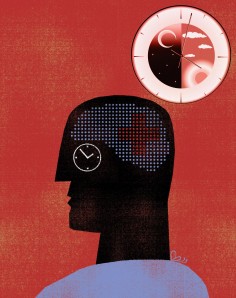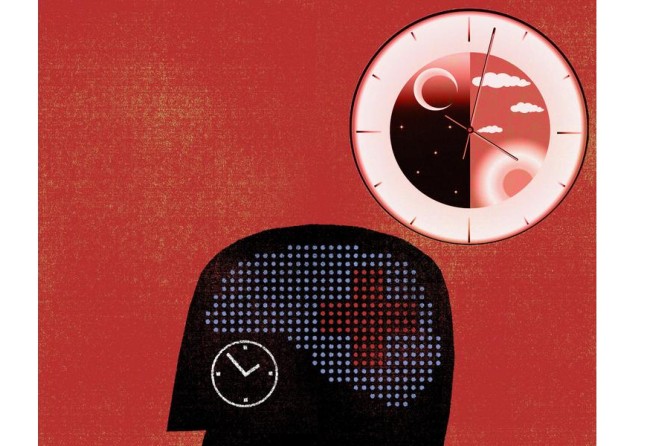
Electric lighting interferes with the body's circadian clock, researchers say
Electric lighting may stop us bumping into things in the dark, but it also messes with our biological clock, and that can have grave consequences


A University of Colorado Boulder research team set out to quantify the effects of electric lighting, which became widely available in the 1930s. They monitored eight participants - six men and two women with an average age of 30 - for one week as they went about their normal lives, and a second week as they camped in Colorado's Eagles Nest Wilderness.
Maintaining the circadian cycle is quite important in health maintenance
The participants wore wrist monitors that recorded the intensity of light they were exposed to, the timing of that light and their activity. The timing of their circadian clocks - the body's internal time-keeper that directs the sleep-wake cycle - was also recorded by measuring melatonin levels, a hormone that is released during the biological nighttime and decreases during daytime.
After the camping trip, during which they experienced only sunlight and a campfire, all the participants' sleep-wake cycles became in sync with sunset and sunrise, in spite of their previous propensity to be night owls or early birds. On average, their biological nighttimes started about two hours earlier than when they were exposed to electrical lights.
The study, published earlier this month in the journal Current Biology, shows how artificial lighting can affect the body's internal clock - a disruption which researchers are increasingly showing can have grave consequences for our health.
The role the circadian clock plays in disease and genetics is slowly being unravelled and understood. Some of the latest findings show that women who do shift-work have an increased risk of menstrual disruption and subfertility; that the body clock has an intrinsic power to help fight intestinal bacterial infections; and that severe depression could be linked with altered genes that control the circadian clock.
"Important metabolic functions are heavily influenced by circadian clocks, which is why activities such as chronic night-shift work, which can cause a misalignment of this clock, increase one's risk for metabolic and autoimmune diseases such as obesity, Type 2 diabetes, cancer and multiple sclerosis," says Dr Katerina Akassoglou, a neurology professor at the University of California San Francisco.
Akassoglou's team recently discovered a protein, p75NTR. Present in liver and fat cells, it regulates blood glucose levels, an important metabolic function. A drop in its level affects the timing of other circadian genes in the brain and the liver, as well as genes that regulate glucose and lipid metabolism.
The production of this is controlled by two master genes that direct the body clock. "Just about everything that takes place physiologically is really staged along the circadian cycle," says Leonard Guarente, a professor of biology at the Massachusetts Institute of Technology. "What's now emerging is the idea that maintaining the circadian cycle is quite important in health maintenance, and if it gets broken, there's a penalty to be paid in health and perhaps in ageing."
Guarente's team reported recently that a gene called SIRT1, previously shown to protect against ageing diseases, plays a key role in controlling circadian rhythms. The researchers found circadian function decays with ageing in normal mice, and that boosting SIRT1 levels in the brain could prevent this decay, presenting possibilities in developing treatments for ageing diseases.
The biological clock oscillates over 24 hours and is affected by factors such as temperature, food, sunlight or artificial indoor lighting.
The clock's mechanism, or what scientists call the suprachiasmatic nucleus (SCN), is located in the hypothalamus of the brain, above the point where the optic nerves cross.
Armed with information about surrounding light, the SCN signals the pineal gland in the centre of the brain to secrete hormones that regulate bodily functions. One of these hormones, melatonin, is released when it is dark and causes drowsiness.
Erik Herzog, a biology professor at Washington University in St Louis, studies how our biological clock is wired to be accurate within a few minutes out of the 1,440 minutes per day. His team has identified a push-pull system in the SCN that enables neurons to synchronise precisely with each other and to adjust their rhythms to those of the environment.
This finely tuned system relies on communication networks between neurons that ensure the clock runs as a co-ordinated and precise timepiece, while remaining flexible to environmental changes.
"We think the neurotransmitter network is there to introduce enough jitter into the system to allow the neurons to resynchronise when environmental cues change, as they do with the seasons," says Herzog.
Understanding how our biological clock maintains precision alongside flexibility has important implications for public health and paves the way for treatments to keep biological clocks on time - and possibly diseases at bay.
For example, drugs that enhance SIRT1 activity in humans could have widespread health benefits. Guarente says: "If we could keep SIRT1 as active as possible as we get older, then we'd be able to retard ageing in the central clock in the brain."
Paolo Sassone-Corsi, a professor at the University of California Irvine, teamed up with scientists at pharmaceutical firm GlaxoSmithKline to test proprietary small-molecule compounds that stimulate SIRT1. In mouse studies, they have found evidence that SIRT1-activating compounds can be used to control circadian disturbances, bringing us closer to the development of drugs that target conditions, such as metabolic disorders, diabetes, cancer and ageing.
Professor Steve Kay, dean of Biological Science at University of California San Diego, is studying a protein called cryptochrome that regulates the biological clock and glucose production in the liver. The protein plays a critical role in controlling glucose supply in the blood during our cyclical eating patterns. This is vital for people with Type 2 diabetes, a condition where the body forms a gradual resistance to insulin, which then leads to high blood sugar levels.
Kay's team has discovered a small molecule dubbed KL001 that can stabilise cryptochrome and lengthen the biological clock. Adding this molecule to mouse liver cells inhibited glucose production, offering hope that a drug can be developed to repress glucose production at night in diabetics.
For many of us, some simple steps can help keep our biological clocks in sync. As the University of Colorado Boulder study shows, exposure to more sunlight in the morning and midday could nudge the internal clock earlier.
Also, dimming electric lights at night, forgoing late-night TV and cutting out screen time with laptops and other personal electronic devices also may help internal circadian clocks stay more closely attuned with the solar day, say the researchers.